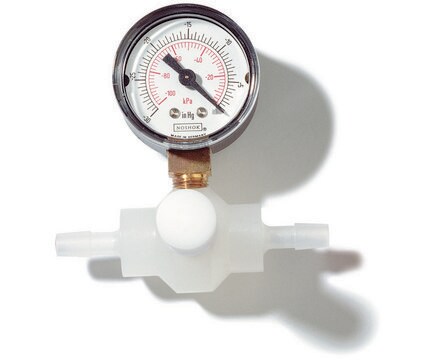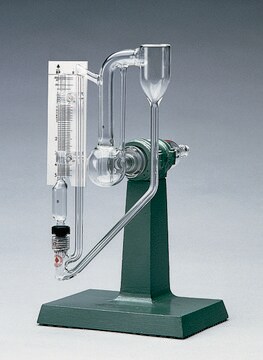NCXAUCR40
Gold Nanospheres
Bare, 40 nm, for Passive Adsorption, Bioready, Bare (Citrate), OD 20, in Aqueous Sodium Citrate
Sign Into View Organizational & Contract Pricing
All Photos(1)
About This Item
UNSPSC Code:
12162002
NACRES:
NA.23
Recommended Products
form
nanospheres
OD
20
particle size
40 nm
Looking for similar products? Visit Product Comparison Guide
Application
Owing to their plasmonic properties nanoparticles of gold and silver find broad range of applications extending from diagnostics to molecular detection, photothermal and microwave-based therapies, and nanotoxicology. Colloidal silver nanoparticles also find applications in antimicrobial coatings, electronics and photovoltaics, and surface enhanced Raman spectroscopy (SERS) whereas the colloidal gold nanoparticles find applications in lateral flow assays (immunochromatographic assays) and as TEM labels and size standards.
The BioReady gold nanospheres are well suited for passive conjugation of antibodies, proteins, peptides, and other biomolecules.
The BioReady citrate gold nanoparticles have a “naked” particle surface which contains a weakly bound citrate molecule as stabilizer. The citrate is readily displaced in presence of proteins and allows passive adsorption (also referred to as physisorption). The mechanism of adsorption is based on Van der Waals interactions between the proteins (e.g. antibodies) and the surface of the particles. The resulting forces between the antibody and the nanoparticle are influenced by the coupling environment. Our BioReady citrate gold is provided at an optical density (OD) of 20 at pH ~8.0–8.5. A pH titration should be performed to optimize the pH of conjugation.
The BioReady carbonate gold nanoparticles have a “naked” particle surface that contains a weakly bound carbonate molecule as particle stabilizer and, similar to citrate-stabilized gold, the carbonate is readily displaced in the presence of proteins and allows easy passive adsorption. Carbonate is a smaller and less complex molecule and has a lower affinity to the gold nanoparticle surface compared to citrate. This enhances the displaceability of the carbonate molecules allows better conjugation. Our BioReady carbonate gold is provided at an optical density (OD) of 20 at pH ~7.4–8.6. A pH titration should be performed to optimize the pH of conjugation.
The BioReady gold nanospheres are well suited for passive conjugation of antibodies, proteins, peptides, and other biomolecules.
The BioReady citrate gold nanoparticles have a “naked” particle surface which contains a weakly bound citrate molecule as stabilizer. The citrate is readily displaced in presence of proteins and allows passive adsorption (also referred to as physisorption). The mechanism of adsorption is based on Van der Waals interactions between the proteins (e.g. antibodies) and the surface of the particles. The resulting forces between the antibody and the nanoparticle are influenced by the coupling environment. Our BioReady citrate gold is provided at an optical density (OD) of 20 at pH ~8.0–8.5. A pH titration should be performed to optimize the pH of conjugation.
The BioReady carbonate gold nanoparticles have a “naked” particle surface that contains a weakly bound carbonate molecule as particle stabilizer and, similar to citrate-stabilized gold, the carbonate is readily displaced in the presence of proteins and allows easy passive adsorption. Carbonate is a smaller and less complex molecule and has a lower affinity to the gold nanoparticle surface compared to citrate. This enhances the displaceability of the carbonate molecules allows better conjugation. Our BioReady carbonate gold is provided at an optical density (OD) of 20 at pH ~7.4–8.6. A pH titration should be performed to optimize the pH of conjugation.
Storage and Stability
DO NOT FREEZE. Store at 2-8C and away from light when not in use to maximize shelf life. Nanomaterials can be sensitive to high and low pH conditions and high salt concentrations. Use caution when changing environmental conditions as particles may aggregate.
Legal Information
Product of nanoComposix, Inc.
Storage Class Code
10 - Combustible liquids
WGK
nwg
Flash Point(F)
Not applicable
Flash Point(C)
Not applicable
Choose from one of the most recent versions:
Certificates of Analysis (COA)
Lot/Batch Number
It looks like we've run into a problem, but you can still download Certificates of Analysis from our Documents section.
If you need assistance, please contact Customer Support.
Already Own This Product?
Find documentation for the products that you have recently purchased in the Document Library.
Our team of scientists has experience in all areas of research including Life Science, Material Science, Chemical Synthesis, Chromatography, Analytical and many others.
Contact Technical Service






